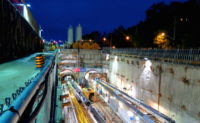Canada To Build First Cross-Country EV Charging Network
Canada is on track to have the first transcontinental electric highway, with plans announced by former state-owned energy firm Petro-Canada to roll out 50 high-powered electric vehicle charging stations along the 4,860-mile Trans-Canada highway by 2020.
Now part of Calgary-based giant Suncor Energy, Petro-Canada will start work this spring on the network, to extend from Nova Scotia to British Columbia. The firm did not announce exact locations for the charging stations nor construction costs or contractors.
“With more than 1,800 retail and wholesale locations across the country, we have the network in place to build Canada’s first electric highway, providing coast-to-coast charging for our customers,” said Kris Smith, Suncor executive vice president for downstream markets, in a statement.
Each of the charging stations or stops will feature two high-powered chargers and two waiting spots.
The 200-kW chargers can juice an electric car’s battery to 80% in 30 minutes, according to Petro-Canada. The chargers will also have capacity for future upgrades to 350 kW and will be equipped with CHAdeMO and CCS/SAE connectors to support a wide range of electric vehicles, Petro-Canada said.
Electric-car drivers will have to wait for similar coast-to-coast convenience in the U.S., says automotive review and ranking website Cars.com.
It says the U.S. Energy Dept. website can theoretically plot a route from New York to Los Angeles, but drivers would face long stretches with no charge stations or ones that only Tesla-produced vehicles can use.
Many also lack the power of Petro-Canada’s chargers. Recharging can take from several hours to days on older “legacy” chargers, Cars.com says.
“We strenuously … would not recommend anyone actually attempt to drive this route in an electric car; it would take a long, long … long time,” says reviewer Brian Wong.



